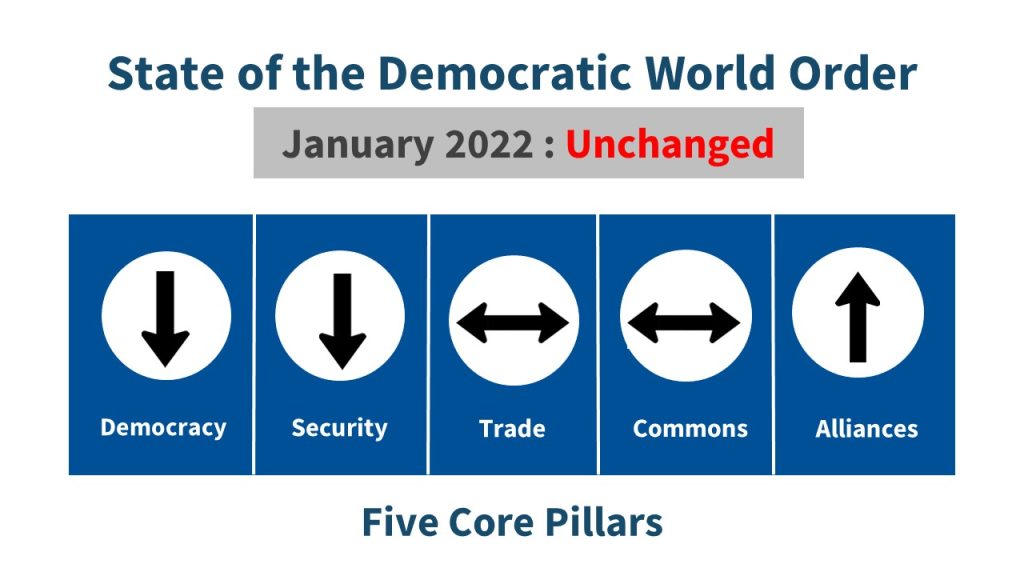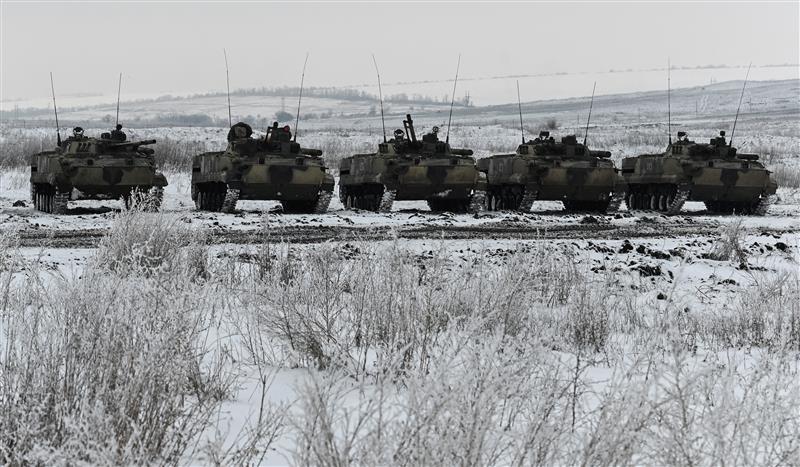Reshaping the order
This month’s topline events
Kremlin Escalates War Threat. Russia deployed thousands of troops to Belarus, adding to a threatening military buildup that now surrounds Ukraine on three sides. US and allied officials also revealed the Kremlin plans to create a pretext for a further invasion of Ukraine with a false flag attack against Russian troops, and initiate a coup to topple Ukraine’s government. After high level negotiations with Moscow, NATO allies stood firm in rejecting Russia’s demands that NATO promise to stop future expansion and remove military personnel and equipment from Eastern Europe. The US and other allies announced increased weapons deliveries to Ukraine and troop commitments to frontline NATO states, while offering to continue negotiations to reach a practical solution.
- Shaping the order. While Moscow has sought to create fissures within NATO, the crisis has so far produced the opposite effect, consolidating allied support for Ukraine and reinforcing the fault line between democracies and autocracies that increasingly marks today’s global order. Despite some tactical differences over the extent of sanctions on Russia and weapons deliveries to Ukraine, the US, France, Germany, Britain, Poland, and other allies remain united in pushing back on Russia’s attempts to undermine the European security order.
- Hitting home. Recognizing that Russian aggression would be harmful to America’s security and economic interests, recent polling indicates bipartisan support among the American people to deter Russia and stand in support of Ukraine.
- What to do. While seeking to deter a near-term Russian offensive, the US should work with allies to counter what may be Russian President Vladimir Putin’s longer-term strategy of attrition to wear down Ukraine and test Western resolve. At the same time, Washington should continue to engage closely with Berlin and Paris to develop a unified sanctions policy, including terminating the Nord Stream 2 gas pipeline, should Russia further invade.
Russian Troops to Kazakhstan. Vowing not to allow “color revolutions,” Russia sent several hundred troops to Kazakhstan to help clamp down on anti-government protests and bolster the position of the country’s authoritarian leader Kassym-Jomart Tokayev. Putin ordered the intervention under the auspices of the Collective Treaty Security Organization (CSTO), a security alliance that includes Russia and five other former Soviet states, marking the first time that its mutual defense clause has been invoked. Kazakh police forces opened fire to quell the demonstrations, leaving dozens dead and thousands injured, after which CSTO troops were withdrawn.
- Shaping the order. Russia’s actions in Kazakhstan build on a series of successful interventions to help suppress civilian uprisings, including in Syria, Venezuela, and most recently, Belarus. The move further solidifies Moscow’s regional sphere of influence and marks a significant turning point for the CSTO, which Putin envisions as a potential counterweight to NATO.
- Hitting home. Russia’s use of military force and efforts to bolster authoritarian regimes are leading to a world that is more hostile to American values and interests.
- What to do. The Biden administration should work with allies to develop new models of support for nonviolent civil resistance movements and independent media, including by advancing the norm of a “right to assist” and increasing pressure against autocratic regimes.
China Squeezes Lithuania. China intensified its coercive economic campaign against Lithuania, implementing a ban on Lithuanian imports and pressuring multinational corporations to reduce investments in Lithuania and stop sourcing supplies from that country or face additional hurdles entering the Chinese market. Beijing’s actions were in retaliation for Lithuania’s decision to allow Taiwan to open a representative office in its own name. In a show of solidarity, the EU accused Beijing of “discriminatory practices” and filed an action against China at the World Trade Organization – a move also supported by the United States.
- Shaping the order. China’s pressure tactics against Lithuania are part of an ongoing pattern of coercion and “wolf warrior” diplomatic tactics against smaller democracies, aimed at forcing them to accept Beijing’s political diktats. While Lithuania has so far stood firm, China is likely to use its global economic clout to intensify the use of these tactics against other countries.
- Hitting home. Beijing has used similar tactics against the United States, placing pressure on the NBA, Hollywood studios, universities, and other US actors to avoid criticism of China.
- What to do. The United States should coordinate closely with European and other allies to help insulate Lithuania from potential economic fallout, and should look to develop a broader strategy, including moving supply chains in critical industries away from China, to render the democratic world less vulnerable to autocratic coercion over time.
Quote of the month
“Now what we see is that Russia and China are becoming closer and closer… [T]hese are two authoritarian regimes that do not share our values when it comes to democracy, the rule of law, the rules-based international order… So all of us who believe in the rule of law, democracy, in the freedom of press, we need to stand together, and that makes NATO just even more important… in a time where we see authoritarian regimes stepping up.”
– NATO Secretary General Jens Stoltenberg, speaking to the Atlantic Council, January 28, 2022

State of the Order this month: Unchanged
Assessing the five core pillars of the democratic world order
Democracy (↓)
- As described above, Russia’s military intervention in Kazakhstan bolstered support for the country’s authoritarian rulers, as local police forces opened fire on anti-government protestors.
- Myanmar’s ousted civilian leader Aung San Suu Kyi was sentenced to four years in prison, after being charged with various crimes by the military government that seized power in a coup in 2021.
- The army in Burkina Faso overthrew and arrested the country’s elected president, Roch Kaboré – a blow to the fledgling democracy there and the third successful coup in West Africa in the past eight months.
- The Kremlin is reportedly developing plans to institute a coup against Ukraine’s democratic government, replacing it with pro-Russian leadership.
- With these developments, the democracy pillar was weakened.
Security (↓)
- With over one hundred thousand Russian troops poised to launch a full-scale offensive against Ukraine, the US and other NATO allies delivered weapons to the Ukrainian government and announced plans to deploy troops to frontline nations in Eastern Europe.
- North Korea test-fired a series of missiles, including what it claimed was a hypersonic missile and the longest range intercontinental ballistic missile launched in years, in defiance of UN Security Council resolutions that prohibit such tests.
- In an escalation of the long-running military conflict in Yemen, the Iran-backed Houthi militia attacked the United Arab Emirates in an apparent drone strike that killed three civilians, and later fired ballistic missiles that were intercepted by UAE defense forces.
- China and Russia conducted joint naval exercises in the Arabian Sea, the latest in a series of joint military drills that have become more frequent and geographically widespread.
- Overall, the security pillar was weakened.
Trade (↔)
- The Regional Comprehensive Economic Partnership came into effect, becoming the world’s largest free trade agreement, with 15 members, including China, Japan, South Korea, and Australia.
- As described above, the EU initiated a case against China at the WTO, alleging discriminatory practices after China blocked the import of Lithuanian products.
- Overall, the trade pillar was unchanged.
Commons (↔)
- Israel became the fifteenth nation to sign the Artemis Accords, a set of principles developed by the United States and others to govern space exploration, including the extraction of natural resources on the moon and from comets and asteroids.
- Nations around the world, and particularly in Europe, began easing COVID travel and social restrictions, as the omicron variant appeared to have reached its peak.
- While these developments trended positive, the overall global commons pillar was unchanged.
Alliances (↑)
- With the escalating threat of a Russian invasion of Ukraine, NATO allies acted in solidarity in rejecting Russia’s demands to permanently halt NATO expansion and calling on Russia to deescalate the situation through diplomacy.
- While facing criticism for refusing to provide weapons to Ukraine and equivocating on the future of Nord Stream 2, the new German government joined NATO and EU allies in standing with Ukraine and warning of strong sanctions should Russia further invade Ukraine.
- The threats from Russia reignited discussion within Sweden and Finland on whether to join NATO, a prospect that US officials announced they would be open to discussing.
- President Joe Biden held a virtual meeting with Japanese Prime Minister Fumio Kishida to discuss regional security concerns and the importance of the US-Japan alliance. Separately, Japan signed a landmark defense agreement with Australia, allowing for closer military cooperation in the context of a rising China.
- On balance, the alliance pillar was strengthened.
Strengthened (↑)________Unchanged (↔)________Weakened (↓)
What is the democratic world order? Also known as the liberal order, the rules-based order, or simply the free world, the democratic world order encompasses the rules, norms, alliances, and institutions created and supported by leading democracies over the past seven decades to foster security, democracy, prosperity, and a healthy planet.
This month’s top reads
Three must-read commentaries on the democratic order
- Bret Stephens, in the New York Times, suggests it is time to bring back the concept of the “free world,” both for its clarifying power and its moral force.
- Angela Stent, in Foreign Affairs, writes that the “Putin Doctrine” aims to split the transatlantic alliance and renegotiate the end of the Cold War.
- Ivo Daalder and James Goldgeier, also in Foreign Affairs, contend that the United States and its allies must stand together to deny Russia its true aims of preventing Eastern European nations from controlling their own fates.
Action and analysis by the Atlantic Council
Our experts weigh in on this month’s events
- Fred Kempe, writing for CNBC, contends that Biden needs to channel Harry Truman’s model for constructive US leadership to rally allies and counter Putin’s designs on Ukraine.
- Barry Pavel and Jeffrey Cimmino, in the National Interest, argue that the US must strengthen and revitalize its alliances to advance mutual interests and navigate a new era of great power competition.
- Matthew Kroenig and Mark Dubowitz, in the Wall Street Journal, suggest that the United States must consider the use of military force to halt Iran’s nuclear program if necessary.
- Melinda Haring, in The Hill, outlines clear steps the United States must take to help resolve the Russia-Ukraine crisis, as European security hangs in the balance.
- Dan Fried, in the Financial Times, underscores the importance of US solidarity with European allies in the face of Russian aggression.
- Ash Jain, quoted in The Hill, discusses the impact of the January 6 insurrection on America’s global image and ability to lead the free world.
__________________________________________________
The Democratic Order Initiative is an Atlantic Council initiative aimed at reenergizing American global leadership and strengthening cooperation among the world’s democracies in support of a rules-based democratic order. Sign on to the Council’s Declaration of Principles for Freedom, Prosperity, and Peace by clicking here.
Ash Jain – Director for Democratic Order
Dan Fried – Distinguished Fellow
Jeffrey Cimmino – Associate Director
Danielle Miller – Program Assistant
If you would like to be added to our email list for future publications and events, or to learn more about the Democratic Order Initiative, please email AJain@atlanticcouncil.org.
